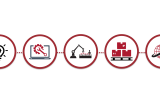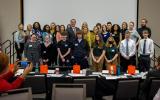Innovations

For the first time in its 57-year history, Dallas College is graduating a class of bachelor’s degree students this year. This occasion marks a pivotal moment for more than 100 students at one of Texas’s largest community college systems, which previously offered associate degrees as its highest degree credential. The program presents students with a life-changing opportunity via a full tuition scholarship and career pathway toward a $60k first-year job. Furthermore, this innovative program attracted the attention of the Bezos Foundation, resulting in the launch of a tuition-free, on-campus...

Congratulations to the 2022-2023 Innovation of the Year Award winners from 32 participating League member colleges! The League initiated the Innovation of the Year Award over 35 years ago to recognize local community college programs and initiatives that reflect the spirit of innovation and experimentation on which our organization was founded. The award provides an opportunity for colleges to showcase their innovative efforts; celebrate the dedicated educators, staff, and administrators who are responsible for this exceptional work; and promote a culture of innovation at their institutions....
Tags:

As apprenticeships gain momentum in higher education across the U.S., students are finding that these opportunities are the perfect springboard into a career they love while businesses are receiving qualified employees who can make a quick transition into their workforce after graduation. And community colleges are the vehicles that bring everyone together, making apprenticeships a win-win-win for everyone involved.
Moraine Valley Community College offers students in its Automotive Technology Program an apprenticeship opportunity through a unique partnership with Nissan North America, Inc. In...

It is no secret that opportunities for students, faculty, and staff to participate in research and innovation are more prominent in university settings than in community colleges in the United States (Arnaud, 2019; Wladis & Mesa, n.d.; Wladis & Mesa, 2019). On a recent study abroad visit to three community colleges, or technical schools as they are called in Denmark, the author discovered that there had been focused research and innovation departments in these institutions for many years. She realized then that the U.S. had some catching up to do.
Inspiration
A few years ago, a team...

Postsecondary institutions have long recognized the importance of student success and retention, with many colleges and universities explicitly emphasizing these goals in their strategic plans (Darabi & Garland, 2018). Throughout the United States, campus learning centers, which the National College Learning Center Association defines as “interactive academic spaces which exist to reinforce and extend student learning in physical and/or virtual environments” (as cited in Darabi & Garland, 2018, p. 4), regularly contribute to success and retention efforts. Delta College, which serves...
Tags:

Virtual student exchange programs have been implemented by higher education institutions across the globe. The Stevens Initiative (2021) found that 214 colleges and universities offered 3,073 virtual exchange programs from fall 2020 to summer 2021 and that 62 of the responding institutions had more than five years of experience with virtual exchanges. These programs, which offer platforms for students to communicate, collaborate, cooperate, and achieve their learning objectives by building learner communities, have been coined by scholars as Collaborative Online International Learning (COIL...
Tags:
April
2023
Authors’ Note: This article is largely excerpted from the authors’ full study report, The Philosophy and Practice of General Education in Community Colleges in the United States, which was presented as a paper at the 2022 International Symposium on General Education and published in the associated Journal of General Education and Multi-Culture (2022), both sponsored by Shih Hsin University, Taiwan. Excerpts of the full study also appeared in the League for Innovation in the Community College’s Learning Abstracts, 24(12), “Understanding general education in the community college: A national...
Tags:

To revitalize the teaching of liberal arts and humanities and improve outcomes in gateway courses, motivated faculty and the Liberal Arts and Humanities Division Dean at Austin Community College formed the Liberal Arts Gateway (LAG)—an incubator for curricular innovation that increased student engagement and retention. Starting with seven faculty in spring 2020, the program now includes almost 50 faculty and offers over 75 sections of redesigned gateway courses in four disciplines. Early data reveal that LAG courses, specifically in the formative Composition I course, outpace traditional...
Tags:

Much like online learning, the concept of course sharing is not new; for decades, college students have taken classes at nearby schools that offer seats for visiting learners. In fact, online course sharing originated in community colleges in the late 1990s (Walker, 2021). Today, given the recent transformations within higher education, alongside great strides in technology, the modes through which course sharing can occur now span across individual institutions, consortia, and online platforms and networks. Thousands of colleges and universities across the U.S. use course sharing frameworks...

In December 2022, Harvard Business Review (HBR) published “The Partnership Imperative: Community Colleges, Employers, and America’s Chronic Skills Gap” (Fuller & Raman, 2022) based on surveys conducted from November 2020 to April 2021. Researchers from Harvard Business School’s Project on Managing the Future of Work gathered 347 responses from leaders in businesses and community colleges in the United States. The researchers identified three broad areas for partnership and stated, in summary:
The partnership between employers and community colleges is currently not fit for the purpose of...
Tags:

In January of this year, Inside Higher Ed (IHE) reported on a meeting between tech executives and presidents of small private colleges in the article, “Preaching to, and Challenging, the Liberal Arts Choir” (Lederman, 2023). The meeting took place in San Francisco in a special session at the annual meeting of the Council of Independent Colleges. IHE (Lederman, 2023) reported that, “In a conversation with presidents of small private colleges, tech company executives praise graduates’ leadership and critical thinking ability but say they need to develop skills for a first job, too” (subheadline...
Tags:

We’ve all gotten emails that attempt to gain sensitive personal information or hack into our employer’s systems. The pervasiveness of malicious hacking, including phishing campaigns, has made the need to combat such efforts a top priority for businesses across the globe. Santa Fe College (SF) is revolutionizing its security curriculum by training students in the Information Technology Education (ITE) department’s ethical hacking class to conduct phishing campaigns in collaboration with Information Technology Services (ITS). Students gain real-world experience protecting the college’s systems...

The rapid advancement of technology and the future of work have increased pressure on the knowledge and skillsets needed for success in the workplace. Social, political, and economic challenges highlighted by COVID-19 and changing global political landscapes have further solidified the need for graduates to be adaptable learners with the mindsets to solve complex problems. Initiated in 2017, Humber College Institute of Technology and Advanced Learning’s Institutional Learning Outcomes project (Humber Learning Outcomes or HLOs) highlights the key mindsets and skills that empower students to...
Tags:

In anticipation of the coming tax season, Paradise Valley Community College (PVCC) in Phoenix, Arizona, is partnering with Jackson Hewitt and Fresh Start Women’s Foundation to expand the pool of highly qualified tax preparers. This strategic alliance between education, business, and nonprofit partners gives students the opportunity to acquire in-demand job skills and offers guaranteed interviews at Jackson Hewitt for PVCC students and Fresh Start women who successfully complete the Enrolled Agent (EA) program.
PVCC’s EA program Certificate of Completion (CCL) prepares students for the...

Ohio has the third largest manufacturing workforce in the United States, employing approximately 700,000 individuals (Wile, 2021). According to the Ohio Manufacturers’ Association (2022), about 17.5 percent of Ohio's gross domestic product was based on manufacturing in 2020. Intel (2022) recently announced that it will build two new microchip factories in Ohio. According to Intel (2022),
As the largest single private-sector investment in Ohio history, the initial phase of the project is expected to create 3,000 Intel jobs and 7,000 construction jobs over the course of the build, and to...

The COVID-19 pandemic and subsequent shift to online learning demonstrated to us that students can not only adapt, but also thrive when provided with diversified and complimentary instructional modes (Ascione, 2021). Inspired by the resiliency of our students, the Geographic Information Systems (GIS) department welcomed students back to Austin Community College (ACC) campuses by piloting a new course modality—Hybrid Flexible, or HyFlex. The HyFlex modality combines online and face-to-face teaching and learning activities in a regularly scheduled class where students are given the choice to...
November
2022
A robust body of research indicates that quality online discussion can lead to better student interaction, greater faculty satisfaction, and improved course outcomes. Pedagogy that supports intrinsic student motivation—by supporting robust peer-to-peer interaction and helping students formulate open-ended questions—can be especially powerful. At community colleges across the country, instructors are tapping the potential of inquiry-based discussion, powered by artificial intelligence, with the aim of boosting engagement in online classes. What they’ve found is that this approach doesn't just...
Tags:

Working professionals like Mohammed Alani are seeking out new ways to expand their skillsets and fit training into their busy schedules. As a professor of cybersecurity at Seneca College and research fellow at Toronto Metropolitan University, Alani doesn’t have the luxury of taking scheduled in-person courses. He was drawn to the Microsoft certificate offerings through Surge Micro-credentials, stating that, “The timing and format were very suitable for a working person like myself.” These online courses offer self-paced lectures, interactive labs, practice exams, live instructor office hours...
Tags:
November
2022
To register for the 2022 virtual Learning Summit while online registration is down:
Download the League account creation spreadsheet (see above);
Fill out and check all required information for yourself; you may also use this form to register other participants from your institution (whether or not they already have a League account); and
Email the completed spreadsheet to Robin Piccirilli.
Tags:

America's workforce now has greater access to Rio Salado College classes, micro-credentials, and degree programs through a new partnership with Guild (n.d.), “a Career Opportunity Platform that enables forward-thinking employers to invest in their employees, unlocking life-changing opportunities for personal and professional growth through learning programs, career development, and one-on-one coaching” (Who We Are page).
Rio Salado College is among Guild’s newest academic partners, and one of the only community colleges to join Guild’s growing Learning Marketplace. The Marketplace provides a...










